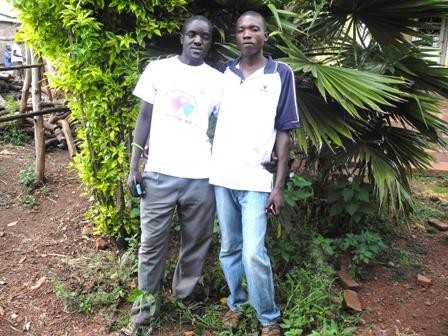
Jean Ndayishimiye, 21, lives in Rwanda’s Kirehe district, where he bought a piece of land in 2012. He soon found out that Jean Marie Vianney Nteziryayo, 27, had purchased a piece next to his. Each was interested in increasing the size of their plot, but the only way to do so was to expand into the plot of the other. Both wanting to maintain the full piece of land they’d purchased, a dangerous feud was sparked between the neighbors.
They are from different backgrounds—Nteziryayo grew up outside the country as a refugee returning to Rwanda after 1994, while Ndayishimiye grew up in the area. They each suspected that there were deeper issues behind their conflict, stemming from ethnic differences, which only served to fuel the dispute.
“I used to go to my land ready to fight, and Nteziryayo was always armed with a machete,” said Ndayishimiye.
Ndayishimiye is a member of a club that listens to Radio Izuba, a community station based in the nearby Ngoma district. It airs Turumwe (“We Are One”), a weekly radio program produced with USAID support to build bridges between individuals and communities on issues that challenge unity and reconciliation throughout the country. Inspired by Turumwe, Ndayishimiye decided to approach his neighbor to discuss how they could peacefully resolve their conflict and asked him to listen in.
“He wanted me to change my mind," Nteziryayo explained. "I listened to the radio program and realized that our conflict was useless and I accepted to reconcile with him. In fact, since I was living out of the country when [the genocide] happened … reconciliation did not mean anything. But today, I do understand the significance of being together as one. Reconciliation is really needed in order to live peacefully with neighbors.”
The two neighbors were able to resolve their conflict, and have chosen to set aside ethnic difference and prejudice in favor of cooperation. Today, they live peacefully and even rented an additional plot of land that they work on together. The story is remarkable, but not entirely unique, as more Rwandans around the country choose reconciliation over revenge, moving the country toward a more peaceful future.
USAID has supported the Turumwe radio program since November 2011 as part of its Maximizing the Impact of Reconciliation project implemented by Search for Common Ground in partnership with the National Unity and Reconciliation Commission.







Comment
Make a general inquiry or suggest an improvement.